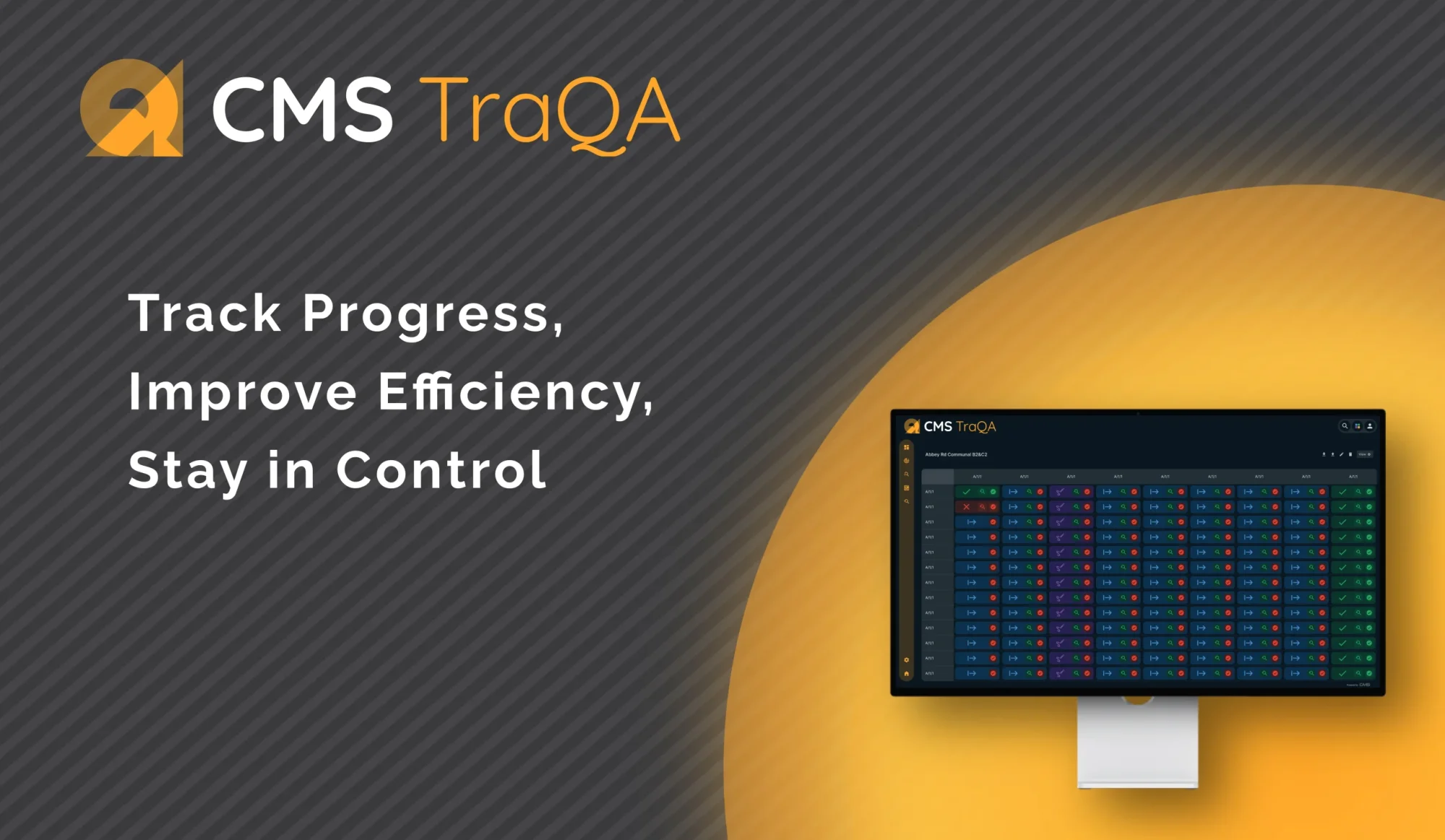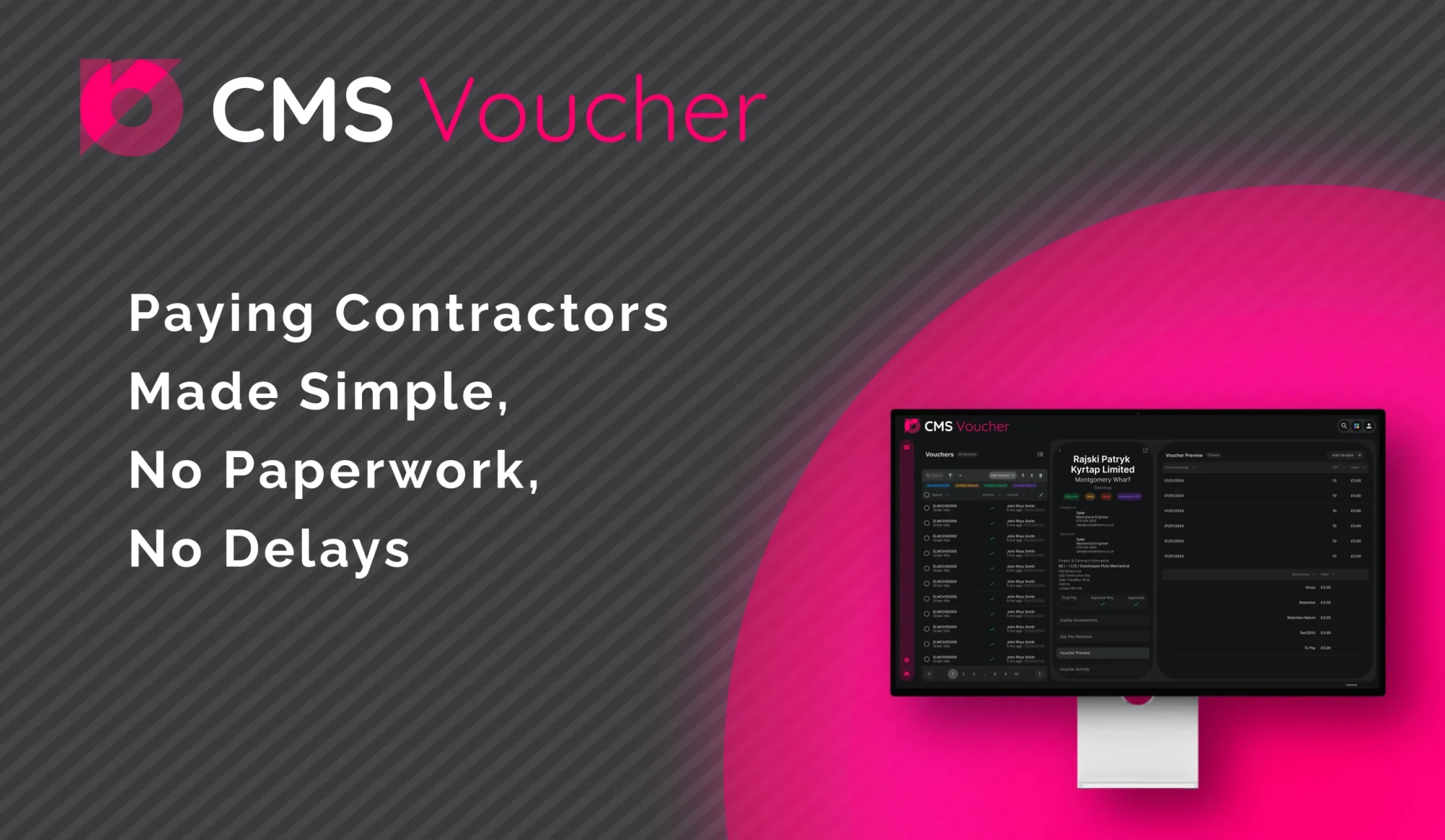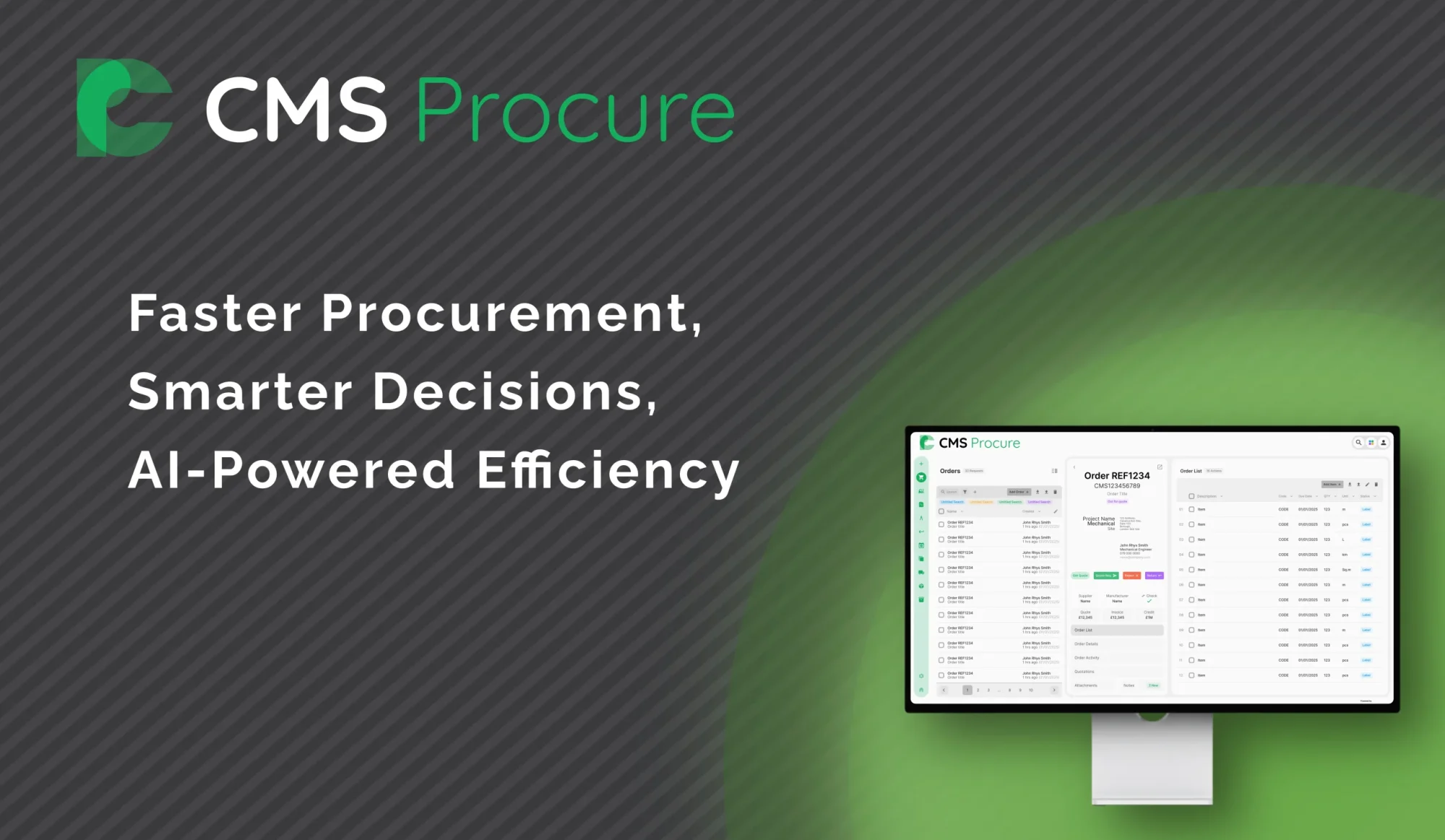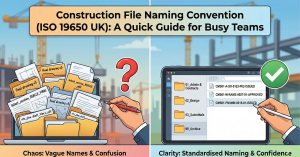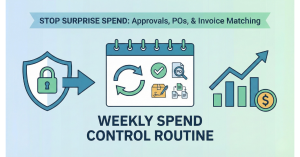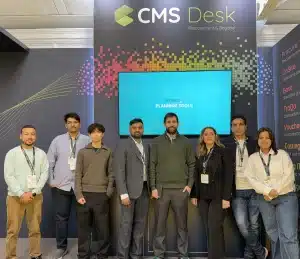In today’s construction industry, one thing is abundantly clear: the most successful projects are those where field crews and office teams work in perfect sync. Yet, despite the sector’s rapid digital transformation, many construction companies still struggle with miscommunication, fragmented data, and delays caused by disjointed workflows.
The solution? Cloud-based construction management software is a powerful technology that not only changes how projects run but also redefines how teams collaborate, communicate, and deliver results.
In this blog, we’ll explore how cloud solutions bridge the critical gap between field and office operations, why they’re essential for modern construction businesses, and how platforms like CMS Desk are empowering companies to achieve seamless, data-driven project delivery.
Why Cloud-Based Software Matters in Construction Project Management
The construction sector is one of the most dynamic industries in the world, and it is also one of the most complex. From multi-stakeholder coordination to rapidly changing site conditions, success depends on precision, communication, and agility. But traditional tools like spreadsheets, paper records, and disconnected software systems can’t keep up with today’s pace.
That’s where cloud technology comes in. Unlike on-premise solutions, cloud-based construction management software
is hosted online, meaning your data, documents, and workflows live in a centralised, always-accessible digital environment. This means no more version confusion, delayed updates, or lost communication threads.
Here’s why this shift is so transformative:
- 24/7 Accessibility: Teams can log in and access live project data from any device, anywhere, whether they’re in the head office, on a job site, or meeting with clients.
- Real-Time Collaboration: Changes made in the field, like progress updates, inspections, or photos, are visible to office teams instantly.
- Scalability & Cost Efficiency: Cloud tools scale with your business and eliminate the need for expensive servers or IT maintenance.
- Automatic Updates & Security: Modern cloud platforms provide continuous software improvements and enterprise-level data protection.
Companies adopting cloud-based project management solutions see productivity improvements of up to 20% and a 15–25% reduction in project delays.
McKinsey & Co
For construction leaders, cloud technology isn’t just an operational upgrade; it’s a strategic necessity to remain competitive.
Common Gaps Between Field and Office Teams
Despite best intentions, field and office teams in construction often operate in silos. The field is focused on execution, managing labour, construction workforce management, materials, and safety. The office handles planning, budgeting, and client communication. While both are vital, misalignment between the two creates serious project challenges.
Here are some of the most common gaps:
- Communication Breakdowns
Project-critical information like design changes or safety notices often gets buried in email threads, phone calls, or messaging apps. Field crews might not receive updates in time, leading to rework, delays, and cost overruns. - Outdated or Incomplete Data
Manual reporting, paper forms, or spreadsheets mean office teams may be working with outdated information. Without real-time visibility into what’s happening on-site, decision-making slows down and risks increase. - Misaligned Priorities
Field teams might prioritise speed and task completion, while office teams focus on compliance, documentation, and cost control. Without a shared view of project objectives, this misalignment can derail progress. - Inefficient Workflows
Approval processes, RFIs, and change orders, and even digital procurement processes, can take days, sometimes weeks, to circulate through email or physical documents. This creates costly bottlenecks and slows the entire project lifecycle.
Poor communication and project data mismanagement cost the construction industry more than $177 billion annually.
FMI Corporation
Cloud software directly addresses these inefficiencies by ensuring everyone is working from a single, real-time source of truth.
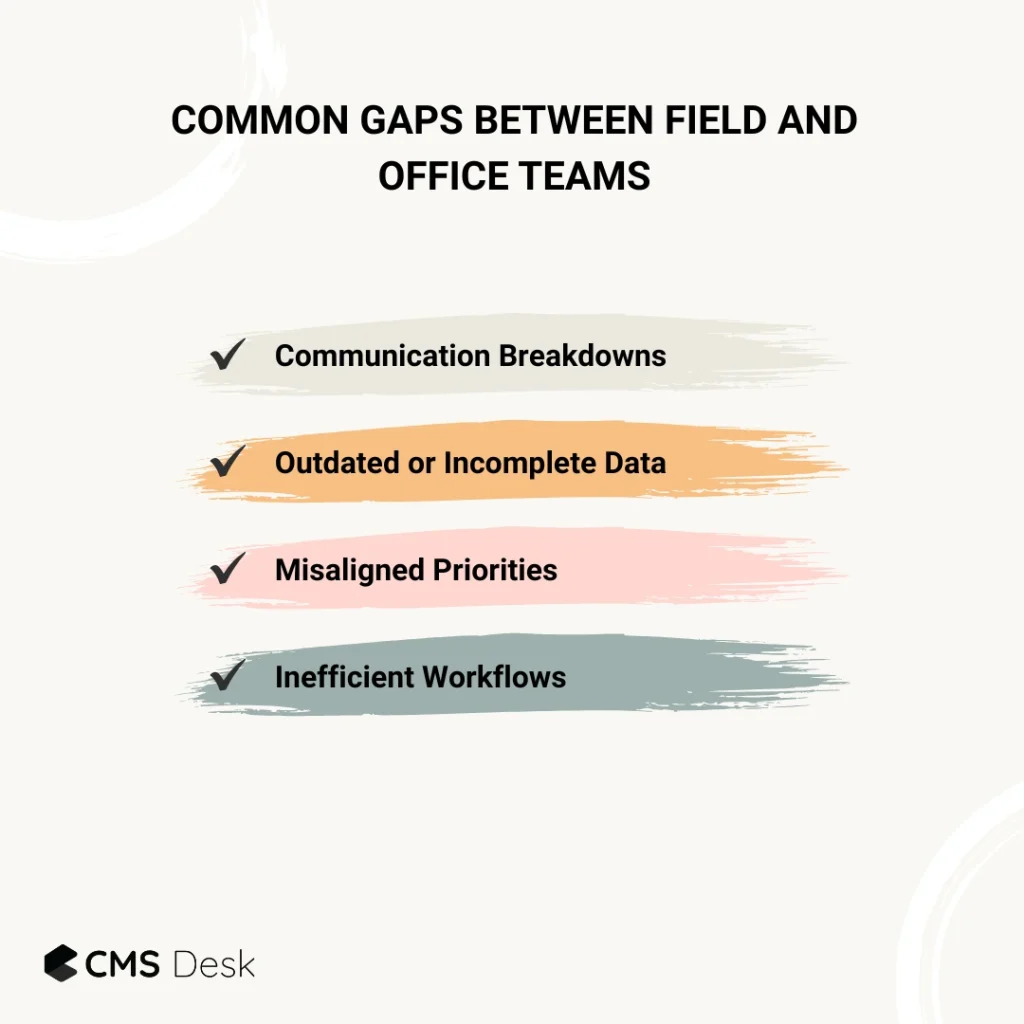
Key Benefits of Cloud-Based Construction Collaboration Tools
Adopting a cloud-based construction management platform does more than just improve communication; it transforms the way projects are planned, executed, and delivered. Here’s how cloud collaboration tools unlock new levels of efficiency and control:
- Enhanced Project Visibility
Executives and project managers can monitor progress, financials, schedules, and risks from a single dashboard. This visibility helps leaders make informed decisions quickly and confidently.
- Streamlined Communication
With built-in messaging, task management, and automated notifications, information flows seamlessly between field and office. Everyone from site supervisors to executives stays aligned and informed.
- Automated Workflows and Documentation
RFIs, submittals, purchase order management software, change orders, and compliance documentation are handled digitally, eliminating paperwork and reducing approval times from days to hours.
- Improved Accountability
Activity logs, timestamps, and digital sign-offs create transparent audit trails. This accountability reduces disputes, improves construction quality control, and builds trust with clients and stakeholders.
- Increased Productivity and Reduced Costs
By removing manual tasks, reducing delays, and improving coordination, cloud tools directly translate into faster project delivery and improved profit margins.
Many construction companies report up to 30% faster project delivery after switching to cloud-based platforms, simply because their teams collaborate better.
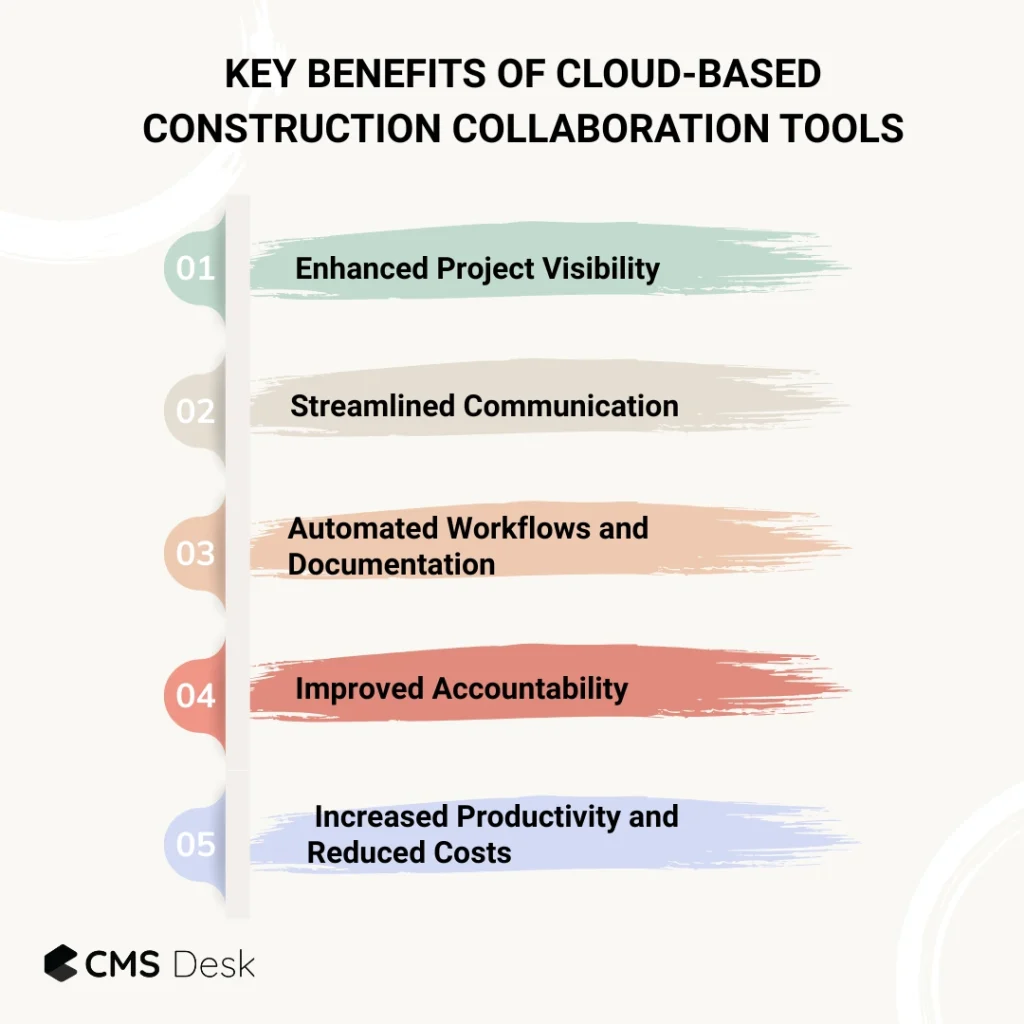
How Real-Time Data Sharing Improves Construction Decisions
In construction, time is money, and the ability to make fast, informed decisions can be the difference between profit and loss. Real-time data sharing is one of the most powerful advantages of cloud-based platforms.
Here’s how it works in practice:
- On-Site Updates That Drive Action
When field crews log progress updates, upload inspection photos, or record safety incidents, that data becomes instantly available to project managers and stakeholders. No waiting for end-of-day reports or weekly summaries, insights are available the moment they’re recorded.
- Better Forecasting and Planning
Real-time data enables predictive analytics and more accurate forecasting. Project managers can use construction resource management to identify trends early, like schedule slippage or material shortages, and take proactive steps before they become costly problems.
- Faster Risk Mitigation
If a safety issue arises on-site, alerts can be triggered instantly, allowing management to take swift corrective action. This not only keeps workers safe but also helps maintain compliance with regulations.
- Improved Client Transparency
Clients increasingly expect live updates and transparency. Real-time reporting enables project teams to share dashboards and progress reports directly with clients, building trust and improving satisfaction.
With live project data flowing seamlessly between field and office, companies can make decisions based on facts, not guesswork, and deliver projects with confidence.
How CMS Desk Supports Cloud Connectivity
At CMS Desk, we’ve built our platform around one simple idea: construction companies shouldn’t have to choose between productivity and collaboration. Our cloud-based software is designed to bridge the gap between field operations and office management, so your entire project team works as one.
Here’s how CMS Desk empowers construction businesses:
- Field-Ready Mobile Apps
Your site teams can capture data, upload photos, complete forms, and submit reports directly from their mobile devices, even offline. This ensures information is always accurate and always current.
- Centralised Documentation Hub
Blueprints, permits, RFIs, and safety manuals all live in one secure, cloud-based location. No more lost documents or version confusion, just instant access to the latest files.
- Real-Time Dashboards & Reporting
From progress tracking to budget monitoring, CMS Desk gives you a live, 360° view of your projects. Custom dashboards make it easy to track KPIs, identify risks, and share updates with stakeholders.
- Automated Workflows & Alerts
Our system automates routine tasks, like sending approval requests, scheduling inspections, or flagging overdue actions , so your team can focus on what matters most.
- Security & Compliance Built In
We use enterprise-grade encryption, secure access controls, and regular backups to protect your data and keep your projects compliant with industry regulations.
With CMS Desk, you’re not just investing in a software tool; you’re equipping your business with a collaborative project management ecosystem that unites people, processes, and performance.
Final Thoughts
The construction industry is evolving, and companies that embrace digital transformation are the ones leading the charge. Cloud-based software is no longer just a convenience; it’s the foundation for collaborative, data-driven, and future-ready construction management.
By connecting field teams and office staff in real time, cloud technology eliminates inefficiencies, reduces costs, and empowers smarter decisions. And with platforms like CMS Desk, construction leaders can harness this power with ease, transforming their operations from reactive to proactive, and their businesses from traditional to truly digital.
Frequently Asked Questions (FAQ)
1. Why is cloud technology essential in construction project management?
Cloud technology enables real-time collaboration, instant data sharing, and seamless communication between field and office teams. It reduces delays, eliminates manual errors, and ensures everyone works from the same, up-to-date information — which is essential for project success.
2. Is cloud-based construction software secure?
Yes. Leading platforms like CMS Desk use advanced encryption, multi-factor authentication, and strict access controls to protect sensitive project data. They also comply with data protection regulations to ensure client and company information is always safe.
3. Can small and mid-sized construction firms benefit from cloud platforms?
Absolutely. Cloud software is scalable and cost-effective, making it ideal for companies of all sizes. It allows smaller firms to compete with larger players by improving efficiency, communication, and visibility.
4. How quickly can a team adopt cloud construction tools?
Most companies experience a smooth transition within a few weeks. Platforms like CMS Desk are designed to be user-friendly, with minimal training required and dedicated onboarding support.
5. What’s the ROI of implementing cloud-based project management?
Companies typically see faster project delivery, reduced rework, improved communication, and increased profitability. The initial investment quickly pays off through time savings, risk reduction, and better resource utilisation.
Any questions? Get in Touch
